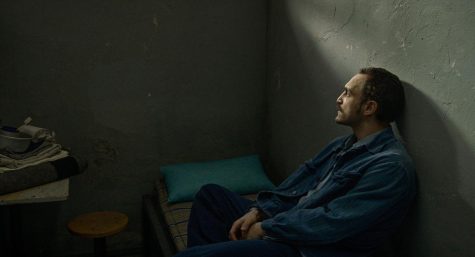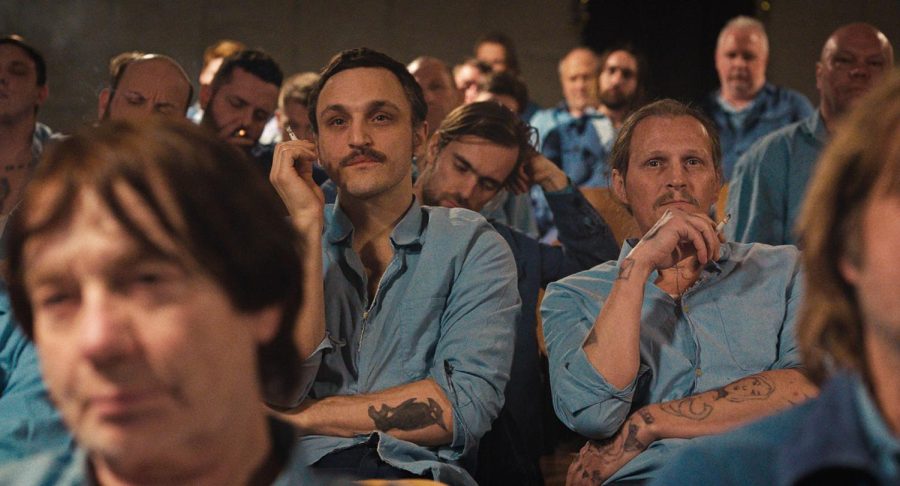Review: ‘Great Freedom’ exposes hope on trial in the face of institutionalized cruelty
Sebastian Meise’s film is a moving portrait of a gay man in a country that criminalized his identity. “Great Freedom” is playing in select theaters.
Sebastian Meise’s “Great Freedom” highlights the criminalization of homosexuality in 20th-century Germany. The film is currently playing in select theaters. (Image Courtesy of MUBI)
March 7, 2022
Sebastian Meise’s “Great Freedom” unveils the shameful and barbarous past of Germany’s criminalization of homosexuality. While difficult to watch, the film also reveals how powerful bonds of human empathy can resist systemic oppression.
To make a film about “great freedom” is an ambitious and auspicious undertaking. To view it, to reflect on it, to write on it is a complicated exercise, especially when the very word “freedom” contains a certain vastness that is nearly ungraspable, the dream of its materialization as inspiring as it is elusive.
In Meise’s “Great Freedom” — which won an Un Certain Regard prize at last year’s Cannes Film Festival — freedom exists as an aspiration that sometimes blazes, sometimes flickers and sometimes dims to near darkness. The tangible essence of freedom — and, ambitiously, a freedom that is great — is remarkable in that it remains largely a great absence in a story whose bleakness and devastation is a heavy reality to witness.
The film follows Hans Hoffmann (Franz Rogowski), a young man who was interned in a concentration camp for homosexuality. Upon World War II’s end, he was sent to prison under Germany’s Paragraph 175, a law criminalizing homosexuality. In prison, Hans shares a cell with Viktor (Georg Friedrich), who at first refuses to live with a homosexual, looming over Hans with the threat of violence. The anticipation of adversity between Hans and Viktor fades as the two become each other’s unlikely confidants throughout the grim decades of their imprisonment.
“Great Freedom” is not a story whose core pulses with an unwavering sense of resilience built from hope, and it is not the film’s purpose to offer a buoyant promise and a happy ending. Hope falters and cracks beneath the battens of torment, alienation and humiliating punishment that Hans and the other prisoners endure. Resilience is born from an instinctual necessity to survive, not from the strength of an ironclad human will, which instead has been bent and nearly broken.
Only once does Hans rage against the dark of his solitary confinement; only once does he stand and scream out with raw fury against his captivity. Most of the time, he cowers. Hans accepts his punishment: He lies on the floor with his thin skin pressed to the cold ground. Otherwise, he sits holding his knees close to his chest, his complexion in the slim light of the closing door as gray as the cement walls caging him. Hans’ glance toward the shutting door depicts a dim portrait of a spirit beginning to wither.
When out of prison, Hans keeps up an attitude of nonchalant rebellion, much to the surprise of his fellow inmates. When warned of the consequence of his so-called transgressions, which include sneaking around at night, beginning an affair with the young, recently-imprisoned schoolteacher Leo and passing coded messages to the love of his life, Oskar, Hans responds by shaking his head. “I will live how I want to live,” he says. This brazen defiance is inspiring — but it returns him, again and again, to jail.
The deep, sincere connection Hans forms with Viktor is one improbable but necessary reprieve from the quotidian miseries he faces. In one heartbreaking scene, Viktor embraces Hans in the courtyard to comfort him through the shock of an insurmountable loss. In many ways, the image of their physical entwinement is the apogee of their understanding of one another, with Viktor’s misgivings and prejudices toward Hans collapsing like the body he holds. They are not each other’s best companions, and they are not each other’s most likely friends. Even their nationalities hold differences, as Hans is German and Viktor is Austrian, both speaking variations of similar but distinct languages.
Beyond the prison’s high-climbing wire fences, Hans and Viktor would never have met. They would have cursed each other; they might never have even thought to look one another in the eye. But here, in a prison of cruelty, Viktor and Hans are each other’s only chance to feel a sliver of kindness. This embrace is what both characters — and all of the other prisoners whom Hans meets — have been longing for throughout the decades in confinement.
The freedoms of the outside world and of sexual expression remain the tangible desires that unite the men, but the underlying essence which moves them is the simple but profound communion offered in the warmth and the kindness of human touch. This empathy allows another human to be seen for who they are — to be seen and not cast away through immense suffering — and to settle into another’s arms despite unbearable pain.
The release, the acknowledgement, the vulnerability to hold and to be held: This is the film’s great freedom. Viktor and Hans’ differences dissolve in this rare, miraculous bond that transcends the brevity of a fleeting physical connection and even an emotional one. The camera swirls around them as though they might float, as though they might fly.
It is in these moments of tenderness and in moments of joy that the devastation of these men’s lives is most palpable — they appear so briefly before being fractured by systemic brutality. Viktor and Hans’ embrace is ripped apart by a prison guard who deems their interaction transgressive, and both are placed in solitary confinement without food, water or light.
This is the one instance when Hans does not walk voluntarily to his sentence. The impossible tragedy of viewing this film is the way its violence becomes routine and expected, while other scenes offering the promise of uplift flicker in flamelike fragility whose light will not last.
Though a reform of Paragraph 175 took place in 1969, the final year represented in the film, the law was not abolished entirely in Germany until 1994, nearly 30 years ago. While the law was in place, around 140,000 men were imprisoned or indicted under this criminal code, and the payment of reparations and pardons to these victims was not passed into law until 2017.
The prolonged time it took to reach this point and the stunning recency of these developments heightens the emotional impact of “Great Freedom.” The traumatic effects of the film’s story are not distant at all. Though it is certainly a difficult viewing experience, it is more important not to look away. Meise’s direction and the performances of the leads refuse to shy away from the scale of duress and struggle, of hope and joy, however brief or intense or shocking, inflicted by an oppressive and discriminatory system.
Contact Alexandra Bentzien at [email protected].
























































































































































